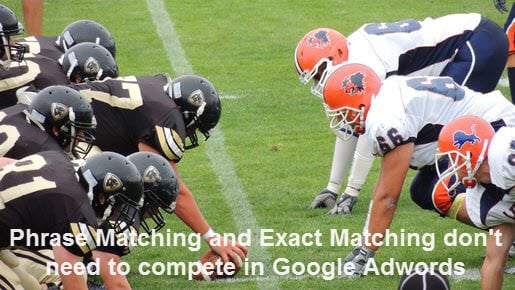A network contact of mine recently described the following problem and asked what I might suggest…
For his Adwords campaign, he chose three keywords (let’s say they were “knitted”, “jumper” and “cardigan”). He selected phrase matching, where the keywords or keyword phrase is enclosed in quotes and the advert gets displayed if the searcher inputs a phrase that includes the keyword. He had hoped that this meant the ad would appear when someone typed in “knitted jumper” or “knitted cardigan”, but what actually happened is that the ad showed up whenever someone searched on a phrase including any one of the search words. So although they got some clicks that were spot on, they also got clicks from people who searched for things like “babies blue lycra cardigan” or “Bon Jovi knitted T-shirts”, which he found annoying.

You can mix Phrase Match, Broad Match, and Exact Match keywords in the same ad group. For instance, you could have the keyword “knitted jumper” plus one for [knitted jumper] and another for knitted jumper. The former would display your advert whenever a user typed in a search phrase that contained the term knitted jumper – so a search phrase such as ‘purchasing a knitted jumper online’ would show your advert, whereas it would not get shown for ‘buying a jumper that is knitted’. The second keyword [jumper] would only trigger an advert when the user typed in this exact phrase (with no additional words). The final keyword would trigger an advert whenever one or both of the words ‘knitted’ and ‘jumper’ were searched for (in any order) – so the phrase ‘looking for a knitted cardigan or jumper’ would trigger the advert. The options for keyword matching get very complex – my advert groups generally have dozens or even hundreds of keywords.
A little more on Exact Match, Phrase Match, and Broad Match
- Exact Match: This is the most precise option, where the ad is shown only if the search query matches the exact keyword phrase, with very little variation. Exact match keywords are typically enclosed in square brackets (e.g., [keyword]).
- Phrase Match: Ads may show on searches that include the exact phrase or close variations of that exact phrase, with additional words before or after. Phrase match keywords are typically enclosed in quotation marks (e.g., “keyword”).
- Broad Match: This is the default match type that reaches the widest audience. Ads may show on searches that include misspellings, synonyms, related searches, and other relevant variations. Broad match doesn’t require any special symbol (e.g., keyword).
Do you use negative keywords? This prevents your ad from showing for searches that include that term. It’s useful for filtering out traffic that’s not relevant to the advertiser’s offering, thus improving campaign efficiency. If you did, then you might prevent some of the annoying clicks. For example, if you added a keyword such as -baby and another -babies none of your adverts would display if the user typed in the word baby or babies as part of their search phrase. Useful if you don’t sell baby clothes. Equally, you could use lycra and t-shirt as negative keywords. Just add them to your keyword list.
Find out more about keyword matching options at the Google Help Center




0 Comments